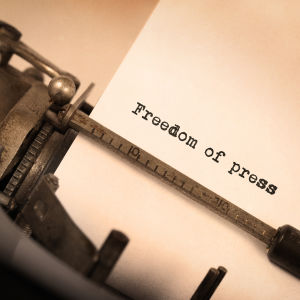Tuesday, May 3, marks the United Nations’ annual World Press Freedom Day. The event is intended to celebrate the media’s vital role in a free society and encourage a free press in countries where that right is under attack.
Unfortunately, however, the Unite Nations has no business hosting such an event.
The organization has proved to be disturbingly hypocritical on the issue of press freedom, frequently engaging in extraordinary measures to silence the media and stifle the press’ ability to cover U.N. proceedings.
For example, in September 2014, U.N. peacekeeping chief Herve Ladsous attempted to prevent reporters from filming a public Q&A session in Sudan by holding up papers to obstruct the view of cameras. When his childish attempt to block the cameras proved ineffective, he canceled the briefing altogether. Instead of apologizing for this chilling abuse of press freedom, U.N. officials made things worse by attempting to coerce a number of websites to remove videos taken at the aborted conference.
A few weeks later, during the height of the Ebola outbreak in West Africa, the United Nations was caught blacklisting a reporter who criticized the response of the World Health Organization, the United Nations’ public health agency, to the crisis. The United Nations blocked the journalist from receiving email updates about the WHO’s Ebola efforts and refused to respond to her questions and interview requests.
Also in 2014, at a tobacco control meeting in Moscow hosted by the WHO, media were banned from reporting on the proceedings and physically removed from the meeting without explanation.
I know. I was there.
I was threatened with arrest, then physically removed from the supposedly public meeting room so I could not report on the proceedings.
Moments after expelling me and other journalists from the conference, the meeting’s delegates secretly passed the world’s first global tax without any media present. The tax — the largest tax in the history of the world — forced more than 180 to collect exorbitant levies on tobacco products and earmark the revenues to pay for things approved by the United Nations.
In addition to banning, threatening and blacklisting reporters who attempt to cover U.N. events, the organization regularly awards prestigious meetings and conferences to countries with little or no regard for freedom of the press.
During the last nine months, the World Health Organization held two meetings in Turkmenistan, a country Reporters Without Borders ranked as the third worst in the world for respecting press freedom. In fact, journalism in Turkmenistan “can only be practiced clandestinely; and when independent journalists are identified, they are liable to be jailed and tortured,” according to Reporters Without Borders.
Still, the United Nations rewarded Turkmenistan’s bad behavior with high-profile conferences that brought in millions of dollars to the despotic, repressive country known for banning gay people, beards and pet dogs, and which is suspected of torturing and killing political prisoners.
In response to growing concerns over the United Nations’ treatment of the media, more than 50 journalists, editors, columnists and thought leaders from 18 countries on six continents joined to sign a coalition letter demanding the organization abide by the same principles of press freedom it expects from its member nations.
The letters’ signers “call on the U.N. to stop its hypocritical conduct and live up to the principles of press freedom.” The letter also implores the organization “to operate in an open, transparent manner that reflects a commitment” to freedom of the press.
These members of the media hope the letter is the first step in ending the United Nations’ assault on press freedom and encourages the organization to allow journalists to freely report on U.N. events and activities.
In order for World Press Freedom Day to be taken seriously, the United Nations must first be willing to practice what it preaches when it comes to freedom of the press.

